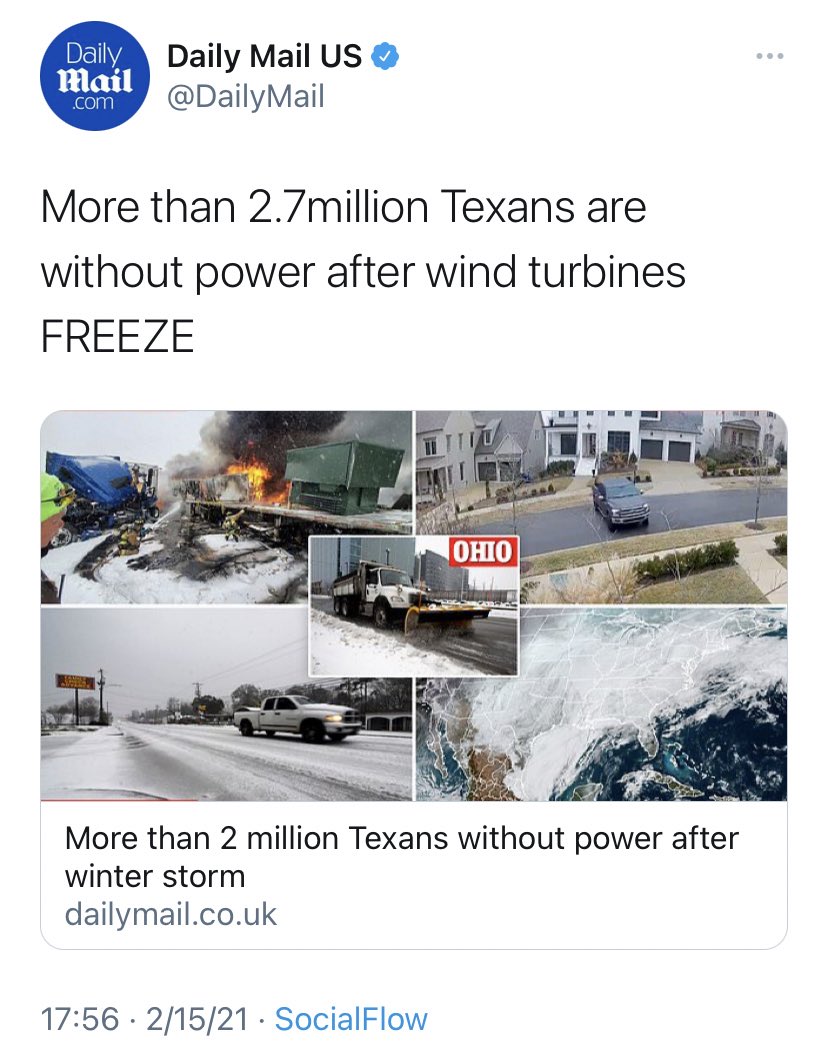GenesisNemesis
I am a proud hedonist.
- Joined
- Jul 24, 2006
- Messages
- 6,069
- Basic Beliefs
- In addition to hedonism, I am also an extremist- extremely against bullshit.
steven monacelli on Twitter: "We need an investigation into why these "rolling" outages haven't been rolling into rich enclaves like Highland Park and Preston Hollow or into Downtown Dallas commercial buildings while other parts of the city have remained without power for the entire day." / Twitter
Andrew Lawrence on Twitter: "Texas Gov. Abbott blames solar and wind for the blackouts in his state and says "this shows how the Green New Deal would be a deadly deal for the United States of America" (link)" / Twitter
then
Steve Vladeck on Twitter: "Even @ERCOT_ISO has confirmed that most of the generating loss has come from (largely deregulated) gas and nuclear facilities.
Rather than taking ownership for *any* of this crisis, @GregAbbott_TX is lying about its cause—to try to score cheap (and inaccurate) political points." / Twitter
County Judge KP George on Twitter: "Why is our Governor on FOX with political hacks complaining about...windmills? I invite him to visit 90 yr olds in Fort Bend w/o heat, water, or power on O2 tanks. Stop the rhetoric. We need leadership, not empty presidential ambitions. We already have empty power grids... (link)" / Twitter
Fox News -- it figures.
County Judge KP George on Twitter: "There is unbelievable human suffering right now, while our first responder crews are at stretched capacities. We need SOLUTIONS. The State, ERCOT, CenterPoint, etc. knew of the storm yet here we are with ZERO solutions & ZERO ETAs. My residents are boiling snow to flush toilets." / Twitter
and
County Judge KP George on Twitter: "This is full failed leadership...in the Energy Capital of the world.
Not "windmills." (link)" / Twitter
noting
Texas’ power grid crumples under the cold | Ars Technica - "Competition for natural gas and frozen wind turbines are only some of the problems."
So while having Texas' full wind-generating capacity online would help, the problems with meeting demand appear to lie elsewhere. An ERCOT director told Bloomberg that problems were widespread across generating sources, including coal, natural gas, and even nuclear plants. In the past, severe cold has caused US supplies of natural gas to be constrained, as use in residential heating competes with its use in generating electricity. But that doesn't explain the shortfalls in coal and nuclear, and the ERCOT executive wasn't willing to speculate.
"ERCOT representative wasn't willing to speculate"...
Sounds to me like structural support infrastructure for power lines wasn't designed with ice weight involved, that pipes were not buried with cold snaps in mind, and that gas lines and pumps were not placed with cold weather expansion/contraction in mind.
Nah, let's mindlessly blame the evil commie democrats instead.

